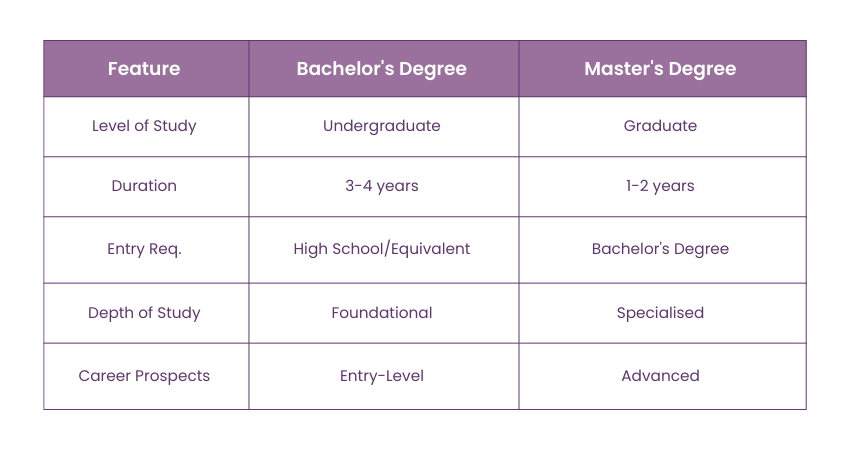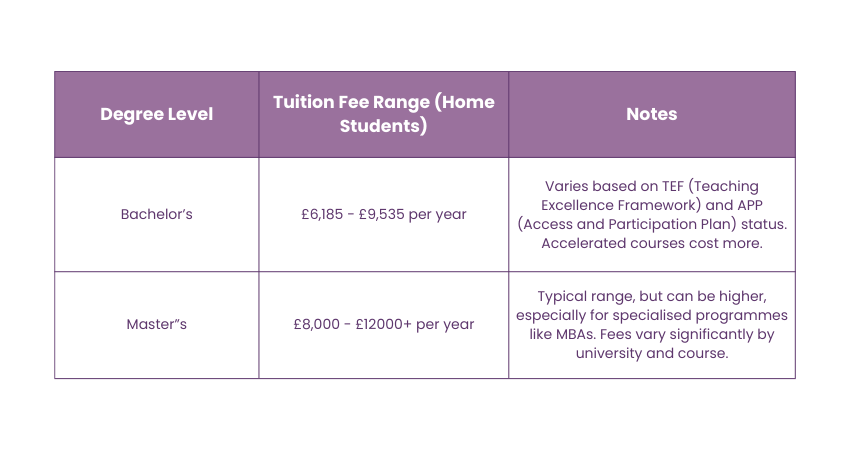We may not have the course you’re looking for. If you enquire or give us a call on 01344203999 and speak to our training experts, we may still be able to help with your training requirements.
We ensure quality, budget-alignment, and timely delivery by our expert instructors.

Emma had always dreamed of a successful career, but with student loans rising and online courses gaining popularity, she wondered—What Is a Bachelor’s Degree, and is it still the right choice?
She wasn’t alone. Every year, thousands face the same dilemma. Studies show that graduates earn around £10,500 more per year than non-graduates—a clear advantage in terms of financial and career growth. However, the question arises: is a degree the only path to success? In this blog, we’ll explore the question and unravel What Is a Bachelor’s Degree, its benefits, and whether it’s the right fit for you.
Table of Contents
1) What is a Bachelor’s Degree?
2) Different Types of Bachelor's Degrees
3) Admission Requirements for a Bachelor’s Degree
4) Career Benefits of a Bachelor’s Degree
5) Difference Between Bachelor's vs Master's Degree
6) Conclusion
What is a Bachelor’s degree?
A Bachelor’s degree is an Undergraduate study that you can opt for to specialise in your preferred subject. It is also referred to as a Baccalaureate or Undergraduate (UG).
This Bachelor's degree acts as a gateway or entry point to higher education. Higher education is mandatory in professions like teaching and training, requiring intense research work.

Moreover, to teach in high school these days, one can easily opt for a Bachelor's degree and an added Certification Course. On the flip side, to teach anything after high school, one must have a Master's degree. Even some private institutions ask for a minimum qualification as a Master's degree, even for high school teaching.
For college teaching, a Master's degree is preferred, but nowadays, a doctorate (PhD) is starting to become the standard course for college training.
This is why choosing your Bachelor's degree becomes so crucial, as it could pave your path in the right way in your PhD selection since it would be time-consuming and not easy to switch to different verticals. For such reasons, it's important to think twice and carefully when choosing your Bachelor's degree.
Different Types of Bachelor's Degrees
Bachelor's degrees in the UK come in different types, each designed for specific study fields and career paths. The four key types include:
1) Bachelor of Arts (B.A.)
Bachelor of Arts focuses on subjects related to the Arts and Humanities. These include Literature, Business, and History. The degree provides a broader education that helps students develop critical thinking and analytical skills for diverse levels of career opportunities.
2) Bachelor of Science (B.Sc.)
Bachelor of Science emphasises scientific, technical, and mathematical subjects, including Engineering, Chemistry, and Computer Science (CS). It involves more specialised coursework and prepares students for careers in research, technology, and Science-related fields.
3) Bachelor of Applied Arts (B.A.A.)
Bachelor of Applied Arts is designed for students pursuing vocational and practical skills in Publishing, Fashion, and Photography, among other similar industries. The course focuses on hands-on training, enabling graduates to directly enter the workforce after their study completion.
4) Bachelor of Education (B.Ed.)
This degree specialises in teacher training and is the primary qualification for teaching-line aspirants. The course aims to prepare graduates for Primary or Secondary educational careers.
Admission Requirements for a Bachelor’s Degree
To get admission to a programme involving a Bachelor's Degree, students must meet specific academic and application requirements.
Academic Requirements
a) A-level completion or an equivalent qualification.
b) GCSEs in English and Mathematics with excellent grades.
c) If students lack the necessary qualifications, they may need to complete their one-year Foundation Course before their Undergraduate studies.
Application Process
a) Students must apply through the Universities and Colleges Admissions Service (UCAS), though some universities allow applications directly.
b) The application typically requires the following details:
i) Personal information (name, contact details, etc.)
ii) Educational qualifications (certificates, grades, and relevant coursework)
iii) Financial status (funding or sponsorship details)
iv) Work experience (if applicable)
v) Personal statement (a written explanation of the student’s goals, interests, and reasons for applying!
Introduction to Managing Budgets Training – Your smart budgeting begins here!
Career Benefits of a Bachelor’s Degree
Earning a Bachelor's degree not only helps you become job competitive but also provides numerous long-term career benefits. Here are some of the Bachelor Degree’s key benefits:
1) Higher Salary Potential: Bachelor's Degree graduates generally earn higher salaries compared to those with formal higher education qualifications. In addition, many industries offer better packages to Degree holders due to their specialised skills and knowledge.
2) Greater Career Opportunities: A Bachelor's Degree opens doors to a broad range of career choices. Graduates can either choose to land into their first job directly or pursue further education. These could include a Master's Degree or a Post-graduate Diploma Course for their expertise enhancements.
3) Job Security: Degree students are less likely to experience unemployment, as many employers prefer hiring higher education qualified candidates. Thus, a degree can provide stability and better job prospects in competitive industries.
4) Faster Career Growth: Degree holders are more likely to be considered for promotions and Management-level positions. Their educational background helps them develop their leadership skills, making them strong career advancement candidates.
Jobs You Can Get With a College Degree
Earning a bachelor's degree opens up a wide range of career opportunities across various industries. Graduates can pursue roles in either Education, Technology, Healthcare, Law, or Business. Some typical job choices include:
a) Teacher: Educating Primary, Secondary, or Higher Education institutional students.
b) Software Developer, Coder, and Tester: Testing Software and Applications designing, developing, and testing.
c) Dentist, Doctor (General Physician), and Nurse: Providing medical care, diagnosing illnesses, and treating patients in healthcare settings.
d) Therapist and Counsellor: Assisting individuals with Good Mental Health, emotional well-being, and personal development.
e) Lawyer: Representing clients in Legal matters, offering Legal advice, and handling court cases.
f) Business Associate: Manages business operations, performs strategy assistance, and supports organisational growth.
g) Analyst: Data evaluation, trends identification, and providing insights in fields like Finance, Marketing, And Technology.
Innovate with AI & Digital Disruption- Join our Entrepreneurship Course today!
Difference Between Bachelor's vs Master's Degree
A Bachelor’s Degree and a Master’s Degree differ in numerous ways, such as duration, academic level, and career prospects. Below are the key differences between these two:

1) Level of Study
a) Bachelor’s Degree: An Undergraduate Degree that serves as a higher educational foundation.
b) Master’s Degree: A Post-graduate Degree that provides advanced field knowledge.
2) Duration
a) Bachelor’s Degree: Typically ranges between three to four years for full-time students.
b) Master’s Degree: Usually takes one to two years, varying on programme and study mode.
3) Entry Requirements
a) Bachelor’s Degree: Requires A-levels, equivalent qualifications, or a foundation course.
b) Master’s Degree: Requires a Bachelor’s Degree in a related field before enrollment.
4) Depth of Study
a) Bachelor’s Degree: Covers broad foundational knowledge and introductory field-related concepts.
b) Master’s Degree: Focuses on specialised, in-depth learning with research or practical applications.
5) Career Prospects
a) Bachelor’s Degree: Qualifies graduates for entry-level positions in most industries.
b) Master’s Degree: Enhances career advancement opportunities, often leading to senior or specialised roles.
6) Research and Coursework
a) Bachelor’s Degree: Primarily coursework-based, with a comprehensive blend of theory, assignments, and exams.
b) Master’s Degree: May involve research-based learning, independent projects, and Dissertations.
7) Further Education Opportunities
a) Bachelor’s Degree: This can be a Postgraduate studies stepping stone, including a Master’s or PhD.
b) Master’s Degree: This can lead to doctoral (PhD) studies or higher professional certifications.
8) Professional Impact
a) Bachelor’s Degree: This helps individuals enter the job market with basic industry knowledge.
b) Master’s Degree: This enhances expertise, leadership skills, and competitiveness in specialised fields.
9) Financial Investment
a) Bachelor’s Degree: Lower tuition fees compared to a Master's Degree.
b) Master’s Degree: Generally, more expensive but can lead to higher salaries in some professions.
How Much Does It Cost?
The cost of a degree varies depending on the level of study, institution, and course type. Below is an overview of typical tuition fees for home students in the UK.

Master KPIs & Data-Driven Leadership- Register for our Introduction to Management Course today!
Conclusion
In today’s job market, skills are highly critical; however, a Bachelor’s degree remains the strongest foundation for career success. While employers value expertise and practical knowledge, a Bachelor’s degree offers structured learning, credibility, and improved career opportunities. Furthermore, understanding What Is a Bachelor's degree and how it shapes your professional path can give you a significant advantage for long-term growth and stability. This shift in focus provides a Glimmer of Hope for Universities, reinforcing their role in equipping students for the future.
Transform efficiency with AI & Data insights- Join our Personal & Organisational Development Course today!
Frequently Asked Questions
What Level Is a Bachelor’s Degree?

A Bachelor's Degree is a Level VI qualification in the UK and EQF Level VI in Europe. In the US, an Undergraduate Degree typically comprises four years of study duration. It provides in-depth knowledge, critical thinking, and professional skills, serving as a career foundation for advancement or further education like a Master’s Degree.
What is the Difference Between a Degree and a Bachelor’s Degree?

A degree is a broad term for any university-awarded academic qualification. These include Associate, Bachelor's, Master's, and Doctoral Degrees. While a Bachelor’s Degree is a Level VI Undergraduate qualification, typically earned after completing secondary education, providing specialised knowledge in a chosen field.
What are the Other Resources and Offers Provided by The Knowledge Academy?

The Knowledge Academy takes global learning to new heights, offering over 3,000 online courses across 490+ locations in 190+ countries. This expansive reach ensures accessibility and convenience for learners worldwide.
Alongside our diverse online course catalogue, encompassing 19 major categories, we go the extra mile by providing a plethora of free educational Online Resources like News updates, Blogs, videos, webinars, and interview questions. Tailoring learning experiences further, professionals can maximise value with customisable Course Bundles of TKA.
What is The Knowledge Pass, and How Does it Work?

The Knowledge Academy’s Knowledge Pass, a prepaid voucher, adds another layer of flexibility, allowing course bookings over a 12-month period. Join us on a journey where education knows no bounds.
What are the Related Courses and Blogs Provided by The Knowledge Academy?

The Knowledge Academy offers various Personal Development Courses, including Motivation and Goal Setting Training, Introduction to Managing Budgets Course, and Entrepreneurship Course. These courses cater to different skill levels, providing comprehensive insights into 15 High-Income Skills That You Should Start Learning in 2025.
Our Business Skills Blogs cover a range of topics related to Business and Leadership Management, offering valuable resources, best practices, and industry insights. Whether you are a beginner or looking to advance your business skills, The Knowledge Academy's diverse courses and informative blogs have got you covered.
Upcoming Programming & DevOps Resources Batches & Dates
Date
 Python Course
Python Course
Mon 26th May 2025
Mon 28th Jul 2025
Mon 22nd Sep 2025
Mon 17th Nov 2025






 Top Rated Course
Top Rated Course



 If you wish to make any changes to your course, please
If you wish to make any changes to your course, please


